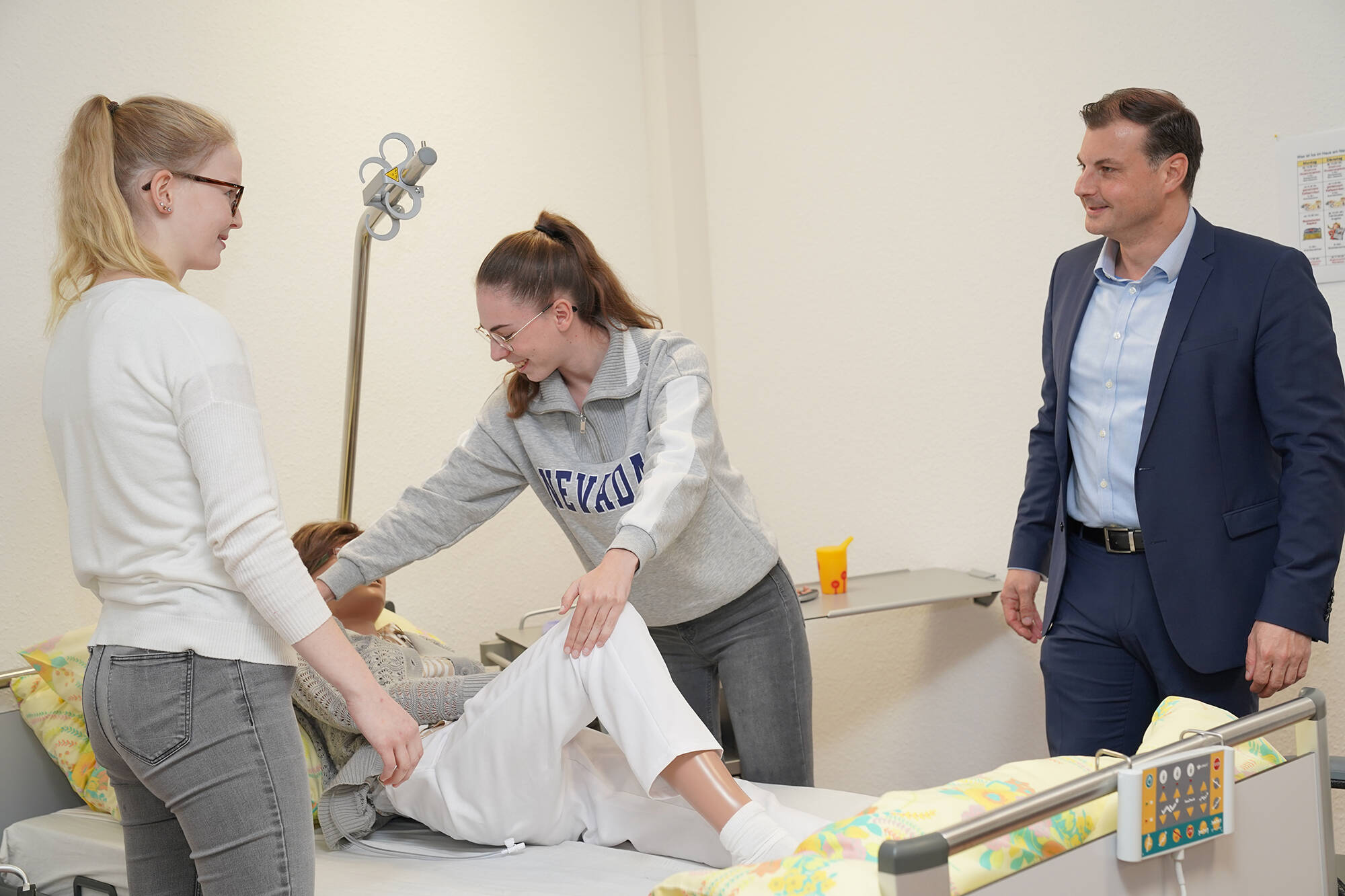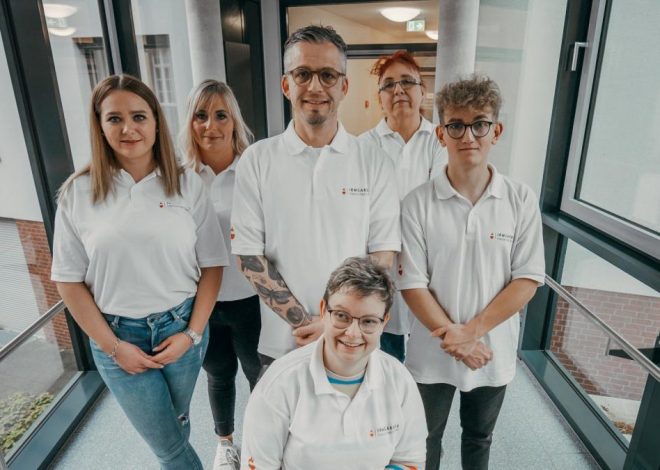
Generalism as an opportunity for training companies
After years of discussion, the Nursing Professions Act was passed in Germany in June 2017. The introduction of generalist nursing training was intended to offer high-quality, contemporary qualifications to all people interested in a nursing career. The debate as to whether the expectations placed on this standardization will be met is still ongoing.
The sponsoring and operating organizations that are members of the Caritas Association for the Diocese of Münster eV offer these reformed training phases to more than 6,000 people (plus trainees from cooperation partners) in 57 Catholic hospitals, 205 inpatient care facilities and 105 outpatient care services or in numerous other facilities associated with the training. After completing the three-year training, the first graduates are now entering nursing practice.
Strengthening the employer as a brand
For many young adults, vocational training and its organization are their first contact with the world of work. It is therefore advisable to pay attention not only to the framework conditions required by the Nursing Professions Act, but also to the environment and to design it in such a way that it is perceived as unique in terms of branding – perhaps even as an employer brand.
The Caritas Association for the Diocese of Münster, in cooperation with the RheinMain University of Applied Sciences, looked at this practice and identified potential areas for action. The study method consisted of a quantitative part of an anonymized, standardized online survey (678 usable data sets). In the qualitative part, interviews were conducted and evaluated (17 guideline-based interviews with 29 nursing functionaries and 5 generalist-trained nursing professionals). This took into account the diverse perspectives on generalist training. Some concise aspects will be explained.
Practice facilities and nursing schools are approaching
The new generation of nursing trainees has different needs than those observed in previous generations (for example, flat hierarchical structures or flexibility in working hours and work content). Training companies and nursing schools are therefore faced with constant adaptation processes in order to meet these new or changed needs.
Even though many nursing schools started the necessary curricular preparatory work in 2018 in order to implement the system-related training change, this preparatory work in the practice facilities only began with a delay. The interviews conducted clearly showed that the structural developments in practice were lagging behind and that the nursing schools had made significant progress. The providers of practical training as well as the former nursing schools and former specialist seminars were faced with a reorientation with the introduction of generalist training. Former specialist seminars in particular had to meet the needs of a large number of cooperation partners (sometimes over 100). These tasks were faced with requirements from the respective supervisory authorities that were partly redundant and often perceived as bureaucratic. Many of these administrative hurdles still have to be overcome (such as required evidence and multiple lists).
With the new legal requirements for personnel and resource specifications, many facilities and nursing schools had to position themselves differently. Some interviewees reported that awareness of the new training had to change first. This applied to all hierarchical levels. It became clear in the interviews that the high “pass-through rates” of trainees through the facilities in particular are challenging for the already dynamic systems with decreasing patient lengths of stay, an increase in multimorbidity and a shortage of staff and skilled workers. Such requirements are all the more demanding when the legal requirements (for example the frequent and rigid changes of work locations) mean that there are hardly any opportunities for the trainees to be socialized in the companies and the wishes and preferences for certain areas can hardly be taken into account on an individual basis.
Practical guidance as a key to attracting and retaining nursing staff
The study also revealed that practical training is to be understood as an essential core of training and is already deeply anchored in some operational structures. A variety of different terminologies and functions have become established in nursing practice (including practical training, released practical training, full-time practical training, central/central practical training, practice manager, practice coordinator). The interviewees agreed that practical training supervisors are a key factor in recruiting and later retaining (potential) nursing professionals.
The study also revealed system-related risks that can be described as structural (because they are inherent in the training system). A majority of those interviewed discussed the current perceived insufficient transfer of knowledge and skills, particularly with regard to the requirements in the pediatric field. Here, the interviewees particularly focused on the too-short assignments in so-called pediatric “alternative locations.”
The time blocks that need to be organized or the timing of the locations that have to be completed during training often become an enormous challenge for the training systems and the trainees. If the trainees are not well supported and looked after in a setting that is perceived as rather difficult, they may be put off. An original decision in favor of training can then be called into question again due to the structural requirements and lead to a training discontinuation, reported some of the generalist trained nursing professionals.
A key factor in the introduction of generalist training was the corona pandemic. In addition, when the nursing training was set up, certain developments in attitudes and value systems were only foreseeable to a limited extent. For the Caritas Association for the Diocese of Münster, this was reason enough to get its own picture of the status quo. The settings they go through are experienced and lived through very individually by the trainees and are therefore described quite controversially in the feedback given. In times of a shortage of skilled workers, however, it is worthwhile for prudent providers and employers to invest in appropriate analyses and to ensure brand-building unique selling points in such areas. The creation of structures to accompany training and a practical instruction concept that covers the entire training period are beneficial in this regard. This is because it is important to retain not only the newly acquired but also the existing staff as well and as long as possible and to include them in the employer brand. The special team structures in Caritas facilities and services seem to have a very special magnetic effect on the former trainees.
Author team:
Jonas Vorderwülbecke, Jan-Hendrik Kappelhoff, Julia Hayck, Hans-R. Hartweg
Caritas Association for the Diocese of Münster eV and RheinMain University of Applied Sciences

Ethel Purdy – Medical Blogger & Pharmacist
Bridging the world of wellness and science, Ethel Purdy is a professional voice in healthcare with a passion for sharing knowledge. At 36, she stands at the confluence of medical expertise and the written word, holding a pharmacy degree acquired under the rigorous education systems of Germany and Estonia.
Her pursuit of medicine was fueled by a desire to understand the intricacies of human health and to contribute to the community’s understanding of it. Transitioning seamlessly into the realm of blogging, Ethel has found a platform to demystify complex medical concepts for the everyday reader.
Ethel’s commitment to the world of medicine extends beyond her professional life into a personal commitment to health and wellness. Her hobbies reflect this dedication, often involving research on the latest medical advances, participating in wellness communities, and exploring the vast and varied dimensions of health.
Join Ethel as she distills her pharmaceutical knowledge into accessible wisdom, fostering an environment where science meets lifestyle and everyone is invited to learn. Whether you’re looking for insights into the latest health trends or trustworthy medical advice, Ethel’s blog is your gateway to the nexus of healthcare and daily living.



